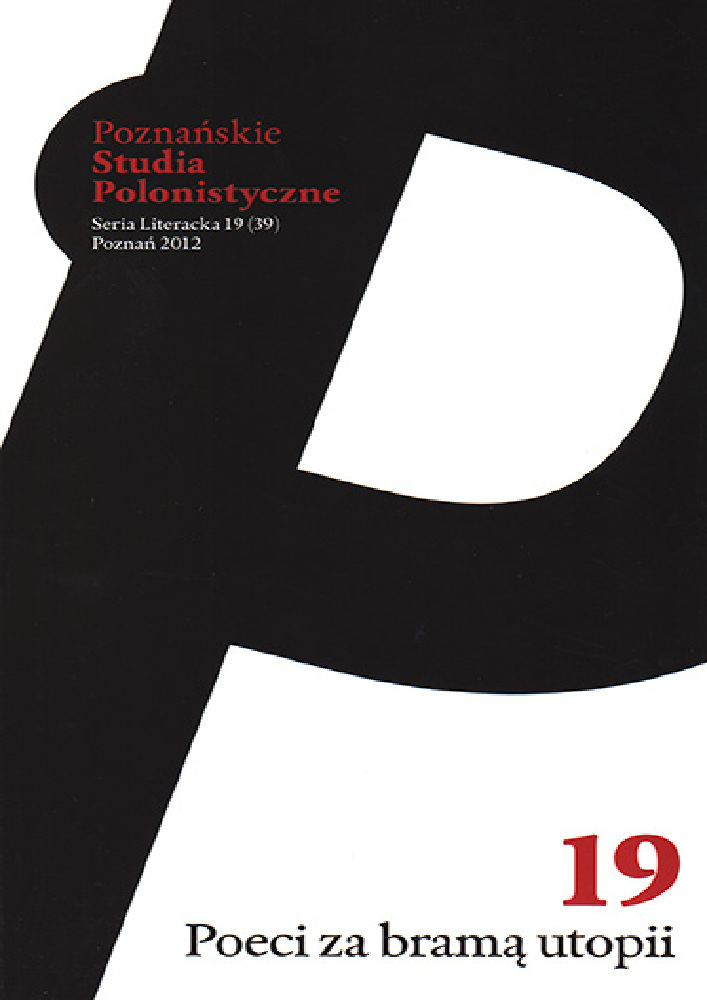Abstract
The article attempts to reveal a reconstruction of Piotr Chmielowski’s critical thought regarding the poetical works written by Adam Asnyk (pen-name E...ly). The starting point for the discussion is a set of variations for different editions of Zarys literatury polskiej as well as other works of the critic elucidating the specificity, importance and the character of the poetry of E…ly. The article attempts to show why it was just the figure of the poet that was necessary and constituted a model figure for revealing the attempts of saving continuance of not only Polish poetry but also national culture and heritage. In his critical reflection, Chmielowski tries to find continuity between the Romantic paradigm and the post-January insurgency paradigm that was to define the obligations and the status of poetry, as well as to identify, uphold important question for Chmielowski himself as to why it was necessary to find among the generation of post-insurgency Poles a figure that would resemble Ignacy Kraszewski, a man-institution, and thus provide an exemplary model, necessary and much needed model figure in upholding and maintaining national consciousness and in preserving continuity. It is the culture and literature of the latter half of the nineteenth century that Chmielowski investigates in search of poetry and the poet as an icon of the nineteenth centuryness and modernity in the post-January insurgency non-poetical times. Asnyk can be seen, in Chmielowski’s terms, as an icon of the modern poet, a keystone figure who straddled the line between what can be consolidated and what was left to be saved in order to preserve the paradigm of Romantic poeticalness and the necessity for adjusting to new cultural circumstances and contemporary expectations on the part of receivers.References
Baczewski A., Twórczość Adama Asnyka, Rzeszów 1984.
Chmielowski P., Geneza fantazji, w: idem, Pisma krytycznoliterackie, t. 1, oprac. H. Markiewicz, Warszawa 1961.
Chmielowski P., Historia literatury polskiej, t. 6, Warszawa 1900.
Chmielowski P., Metodyka historii literatury polskiej, Warszawa 1899.
Chmielowski P., Poezja w wychowaniu, Wilno 1881.
Chmielowski P., Pogląd na poezję polską w pierwszej połowie XIX stulecia. Studia i szkice z dziejów literatury polskiej, t. 2, Kraków 1886.
Chmielowski P., Przedmowa, w: idem, Zarys literatury polskiej z ostatnich lat szesnastu, Wilno 1881.
Chmielowski P., Przedmowa, w: idem, Zarys najnowszej literatury polskiej (1864–1894), Kraków–Petersburg 1895.
Chmielowski P., Zarys najnowszej literatury polskiej (1864–1894), Kraków–Petersburg 1895.
Grzędzielska M., [hasło] PARNAS, w: Słownik literatury polskiej XIX wieku, red. J. Bachórz i A. Kowalczykowa, Wrocław 2009.
Lichański S., „Polscy parnasiści”, „Twórczość” 1962, nr 6.
Mazur A., Parnasizm w poezji polskiej drugiej połowy XIX i początku XX wieku, Opole 1993.
Mocarska-Tycowa Z., Wybory i konieczności. Poezja Asnyka wobec gustów estetycznych i najważniejszych pytań swoich czasów, Toruń 1990.
Nofer-Ładyka A., O Asnyku – rocznicowo, „Polonistyka” 1978, nr 2.
Paczoska E., Krytyka literacka pozytywistów, Wrocław 1988.
License
Authors
Authors of texts accepted for publication in „Poznańskie Studia Polonistyczne. Seria Literacka” are required to complete, sign and return to the editor's office the Agreement for granting a royalty-free license to works with a commitment to grant a CC sub-license.
Under the agreement, the authors of texts published in „Poznańskie Studia Polonistyczne. Seria Literacka” grant the Adam Mickiewicz University in Poznań a non-exclusive, royalty-free license and authorize the use of Attribution-NoDerivatives 4.0 International (CC BY-ND 4.0)Creative Commons sub-license.
The authors retain the right to continue the free disposal of the work.
Users
Interested Internet users are entitled to use works published in „Poznańskie Studia Polonistyczne. Seria Literacka” since 2016, for non-commercial purposes only, under the following conditions:
- attribution - obligation to provide, together with the distributed work, information about the authorship, title, source (link to the original work, DOI) and the license itself.
- no derivatives - the work must be preserved in its original form, without the author's consent it is not possible to distribute the modified work, such as translations, publications, etc.
Copyrights are reserved for all texts published before 2016.
Miscellaneous
Adam Mickiewicz University in Poznań retains the right to magazines as a whole (layout, graphic form, title, cover design, logo etc.).
